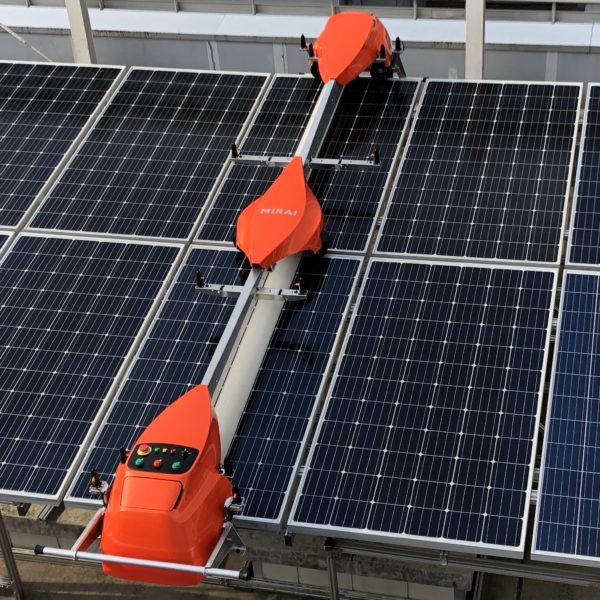For the next 2-month of test period from February 2019, the pilot model of Miraikikai’s Type 2 autonomous dry-cleaning robot will run across the 70MW solar modules of Bhadla Solar Park Phase-2 wiping dust and fine sand particles from the surface.
Solar power’s dilemma: loss from soiling or costs for cleaning?
From the outset, developers and operators of the 2,000MW mega solar park have faced the problem of sand piling on and covering panels, or “soiling loss”, since the power plants came into operation. In the worst case, soiling can impact generation efficiency by more than 10% in a month, according to the Miraikikai’s own research. Many plants have implemented manual wet cleaning, which undermines profitability as the result of high water and labor cost. Some mechanical solutions have been considered as alternatives, but the huge capex to install one machine per each array creates a bottleneck, preventing many solar plants from making this decision. “Our customers say that solar plants are suffering from high developing costs already; they don’t want to pour more money in on top of that,” says Mr. Yamao, the Global Sales Manager of Miraikikai.
Miraikikai’s lightweight smart robot offers an affordable solution
Miraikikai’s Type 2 robot is specially designed to dry-clean solar panels autonomously on arrays that are up to 4m wide. The portable robot requires only two people to move it from one array to another, when it finishes the cleaning cycle. “The solution reduces not only the water cost but also addresses concerns over large capex investment because our robots do more work with less,” says Mr. Yamao. “Many of our customers find our semi-automated solution a huge relief because it doesn’t require large numbers of fixtures to be installed onto their panels. Immediate usability, ease of operation and low financial impact are enabled by the complex robotic algorithms that are our strength.”

Miraikikai are writing a new history of dry-cleaning robot solutions
For a long time now, Miraikikai have become renowned as being at the frontier of industrial robotics by developing a self-driving dry-cleaning solution focusing on solutions for arid regions. “We are true pioneers in this field,” said Dr. Miyake, the President and CEO of the company. “Our solution is totally different in terms of both the approach and the quality. We could have compromised by installing numbers of robots – but instead, we have focused on portable, adaptable, and accessible solutions to provide greater value to our customers.”
Our client who is operating the plant at Bhadla solar park and Miraikikai will conduct the final performance test and adjustment before full implementation of Miraikikai’s Type 2 solution at the site. The 70MW Bhadla Phase-2 plant will add more robots to its site once the test is successfully completed.
